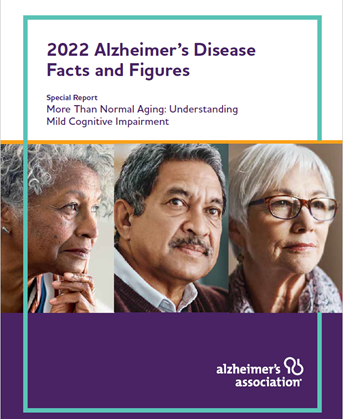A new special report by the Alzheimer’s Association talks about attitudes and barriers around mild cognitive impairment (MCI) and concerns about the workforce needed to help care for people living with dementia and their caregivers. This is part of the 2022 Facts and Figures report series.
Facts, figures, and info from the report specific to American Indian and Alaska Native people (AI/ AN people):
- Less than 1 in 4 AI/ AN people are familiar with mild cognitive impairment
- 47% of AI/AN people worry about developing mild cognitive impairment
- 84% of AI/ AN people would want to know if they had dementia during an earlier stage
- Top reason for AI/ AN people (31%) not seeing a doctor right away for mild cognitive impairment symptoms was learning they might have a serious problem
- AI/ AN people were 3 x as likely as White people to have concerns about good access to healthcare as a concern about seeing their doctor (16% vs. 5%)
- 25% of AI/ AN people question the benefit of early diagnosis compared with 24% of White people
Highlights from Facts and Figures
General Facts
- 6.5 million people 65 and older are living with Alzheimer’s dementia in 2022
- 1 in 9 people 65 and older has Alzheimer’s dementia
- These figures do not include people who have other forms of dementia
- Almost 2 in 10 people 65 and older have mild cognitive impairment; mostly undiagnosed
- 1 in 10 people 45 and older experience worsening or more frequent confusion or memory loss (subjective cognitive decline)
- 1 in 5 women and 1 in 10 men are at risk for Alzheimer’s dementia
- 1 in 3 older adults dies with Alzheimer’s or another dementia
- Alzheimer’s is the 5th leading cause of death for people 65 and older
- Total dementia costs in 2022 are estimated at $321 billion (not including informal caregiving)
- Healthcare costs are almost 3 times more per year on average for people living with dementia compared to people without dementia – for insurance and out of pocket costs
- Average out of pocket costs for people living with dementia was $9,844 in 2021
- 9 out of 10 people with dementia have at least one other chronic disease like heart disease, kidney disease, or diabetes
Caregiving
- Almost half of the caregivers who provide unpaid (informal) help to older adults in the U.S. do so for someone with dementia or Alzheimer’s
- 11 million family and friends provided more than $271 billion in unpaid care to people living with Alzheimer’s and other dementias in 2021
- The total lifetime cost of caring for someone with dementia is $377,621; 70% of that care is paid for by family caregivers
- 8% of older adults with dementia don’t have family or friends to provide help and half of those people live alone
- Nearly 60% of caregivers report high emotional stress from caregiving
Mild Cognitive Impairment
- Less than 20% of people are familiar with mild cognitive impairment
- Almost 2 in 10 people 65 and older have mild cognitive impairment; mostly undiagnosed
- 1- 1.5 in 10 people with mild cognitive impairment go on to develop dementia each year
- 1 in 3 people with mild cognitive impairment develop Alzheimer’s dementia within five years
- Not everyone who has mild cognitive impairment will develop dementia
- 98% of primary care doctors think it is important to diagnose mild cognitive impairment
- 57% think it is difficult to diagnosis
- 65% are comfortable diagnosing
People’s Ideas About Early Diagnosis
- A majority of people (85%) would want to know if they had Alzheimer’s disease early
- Most people (54%) would want to see if they had Alzheimer’s during the mild cognitive impairment stage, compared with the mild stage (31%), the moderate stage (8%), or later (2%)
- Only 5% of adults would never want to know they had Alzheimer’s disease
- Top 4 reasons for getting an early diagnosis (66%+):
- Plan for the future
- Earlier treatment of symptoms
- Make changes to preserve existing health functions
- Understand what is happening
- Top 4 reasons for not getting an early diagnosis (26%+):
- Diagnosis is hard to accept
- Treatment options are limited
- No cure, so it doesn’t matter
- People will treat you differently
- Concerns about seeing a doctor about symptoms (23%+):
- Might get the wrong diagnosis
- Might learn about a serious problem
- Get unnecessary treatment
- Symptoms might just go away on their own
The Dementia Workforce
- 85% of people first diagnosed with dementia are not diagnosed by a specialist; primary care doctors usually make the first diagnosis
- Almost 40% of primary care doctors feel uncomfortable making that diagnosis
- 55% of primary care doctors who care for people with Alzheimer’s dementia don’t have enough dementia care specialists in their communities
- There is a shortage of geriatricians, neurologists, and psychologists
- Rural areas and small towns are particularly hard hit by specialty shortages
- 30%-50%+ increases in-home health and personal care aides exist in all but 2 states
- Low wages, physically dangerous jobs, limited training, high turnover, and understaffing make meeting the workforce demand for aides a big challenge
- The median salary for aides in 2021 was less than janitors and retail sales workers


[…] >>NEW: 2022 Facts and Figures on Dementia, Mild Cognitive Impairment, and Early Diagnosis with Highlights f… […]